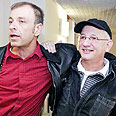
The High Court ruling that the Interior Ministry must register same-sex couples wed in Canada was worded carefully under a cloak of considerable judicial restraint.
Former Chief Justice Aharon Barak, who was joined by most judges on the panel, based his ruling on a the decree that being recorded in the population registry is done for the sake of collecting statistical data and does not have the force of evidence in any matter.
An official certificate attesting to the fact a citizen held a marriage ceremony is sufficient for the official tasked with recording a citizen's marital status.
Justice Barak stressed that the decision does not constitute recognition of same-sex couples. He said that the question of recognizing such marriages is complex and one can hope that the Knesset would address it.
However, until the Knesset does so, it is improper for the interior ministry to make a decision on fundamental questions pertaining to Israeli society, and that any time a new interior minister assumes the post this would lead to a change in registration policy. As long as the people, through its representatives in the Knesset, did not voice its view, a registration official has no authority to decide on fundamental questions in the framework of the population registry, Barak ruled.
If so, the question is why were religious community representatives furious? Perhaps this is after all much ado about nothing?
Well, not exactly. All the parties involved – the religious community on the one hand and the homo-lesbian community on the other – are aware that the question of registration is a symbol in the long battle for the public legitimacy of same-sex families.
The High Court was also well aware that its ruling will become a symbol and be perceived in Israel society as backing the homo-lesbian struggle for full equality and recognition. Precisely for this reason, the court attempted to present its ruling under a guide of judicial technocracy.
The Supreme Court is part of the people and witnessed the violent protest by the religious community in Jerusalem as a result of the gay pride parade. In light of the above social conditions, the judges chose rhetoric of restraint and judicial formalism. However, this ruling still presents a clear attempt to stand by the homo-lesbian community and try to influence these very same hostile social conditions.
Ruling has side-effects
This is precisely where the serious problem associated with the court's latest ruling emerges. The court is in fact attempting to "fool" society into thinking its decision is restrained and necessary – yet none of the parties involved is buying into the idea.
Starting in the 1980s, the High Court took upon itself the role of a guide, shepherd, and social leader regarding what is proper and desired. In this framework, it turned itself into an important arena for promoting the political and cultural objectives of the "Jewish, secular, liberal" group in its battle for shaping the character of Israeli society.
The side-effect of this judicial activity is the loss of political neutrality that characterized the Supreme Court since the country's inception. Accordingly, religious leaders view this ruling as a "wolf in sheep's clothing" and yet another step ahead of the realization of the overriding objective of full recognition of the homo-lesbian community's rights and the establishment, in practice, of a secular country.
Another side-effect of this ruling is that again the decision on a fundamental question is made by the High Court of Justice and not in the Knesset. The court complained that it is improper for an official (the interior minister) to decide on fundamental questions, yet ignored the question of whether it was right for a judge to rule on fundamental questions and order that same-sex coupled be registered.
If a decision on fundamental questions in a democratic country is supposed to be taken by the people, then the court, too, should refrain from ruling this time around.
Dr. Shuky Segev is a constitutional law lecturer at the Netanya Academic College















